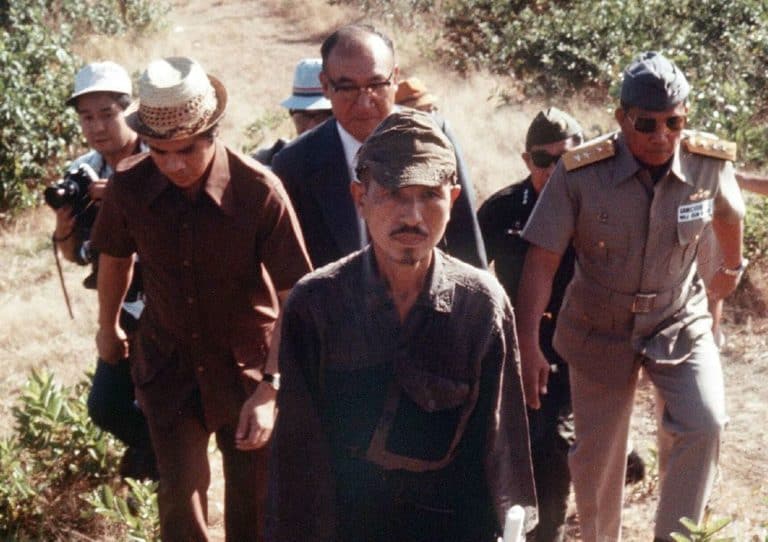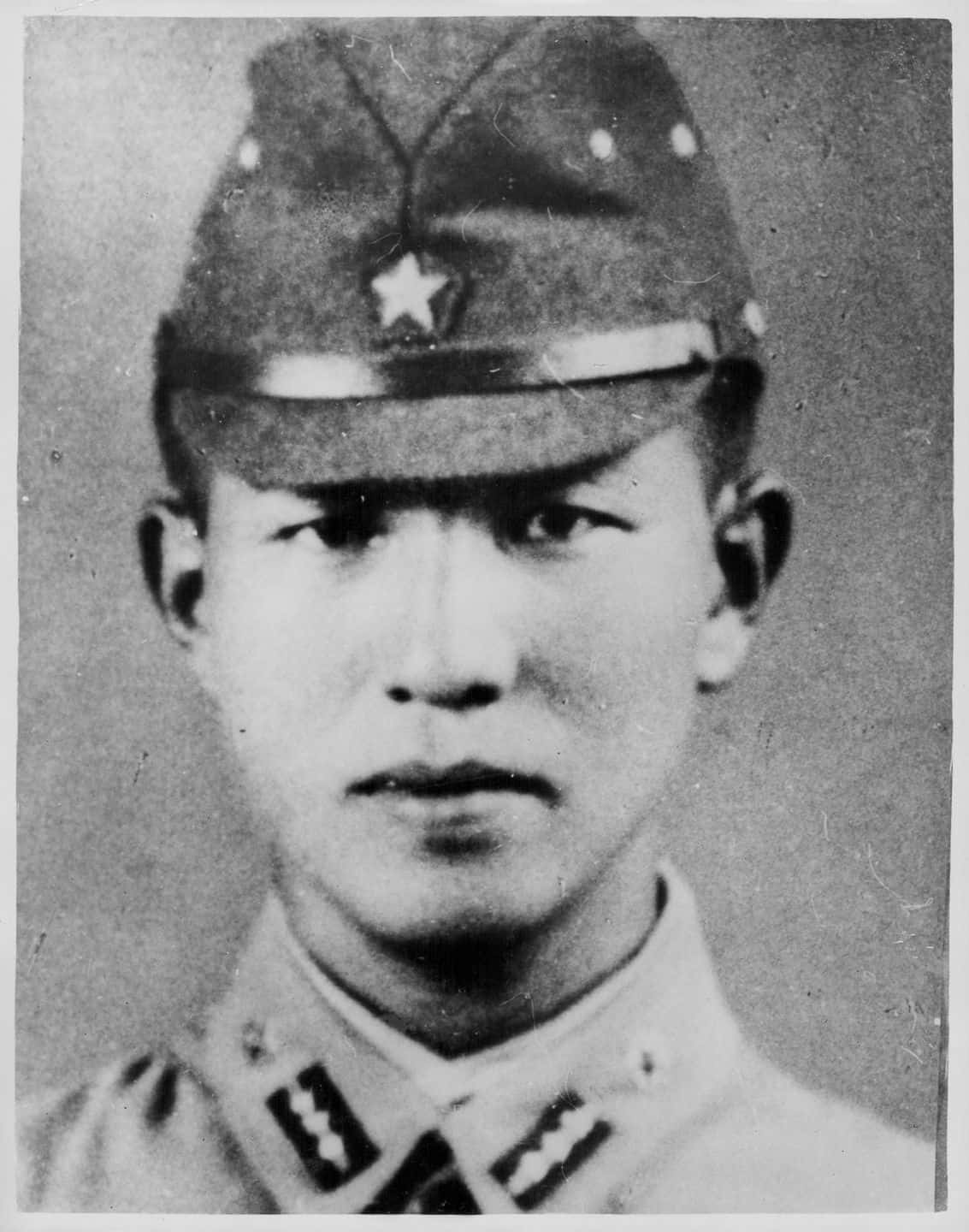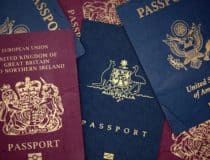The Soldier No One Told


“You are absolutely forbidden to die by your own hand. It may take three years, it may take five, but whatever happens, we’ll come back for you. Until then, so long as you have one soldier, you are to continue to lead him. You may have to live on coconuts. If that’s the case, live on coconuts! Under no circumstances are you to give up your life voluntarily.”
-Lieutenant Hiroo Onoda’s commanding officer
These were the orders given to Lieutenant Hiroo Onoda in December 1944 when the Japanese Imperial Army sent him to the Philippine Island of Lubang to serve the Sugi Brigade. Onoda, as became clear, was intent on following them.
Lieutenant Onoda was part of the Army’s Intelligence Division during World War II, given special instructions to collect information on Allied troops stationed on Lubang, while launching guerilla attacks and remaining out of sight.
 For the next two months, Onoda and his troops wreaked certain havoc on the island, rigging transport ships with explosives, raiding the town, and attacking all Allied troops they came into contact with. In February 1945, however, the Allies gained control of Lubang; Onoda and three other Japanese soldiers were the only men not captured, withdrawing to the jungle.
For the next two months, Onoda and his troops wreaked certain havoc on the island, rigging transport ships with explosives, raiding the town, and attacking all Allied troops they came into contact with. In February 1945, however, the Allies gained control of Lubang; Onoda and three other Japanese soldiers were the only men not captured, withdrawing to the jungle.
Fast-forward six months and the Japanese had surrendered—WWII was over. For Onoda, though, it wouldn’t be over for another 29 years. Onoda and his men faithfully continued to follow their commander’s orders—attacking and raiding the island relentlessly.
Corporal Shoichi Shimada, Private Kinshichi Kozuka, Private Yuichi Akatsu, and Lieutenant Hiroo Onoda survived the jungle by rationing their rice, scavenging for coconuts and bananas, and killing the occasional cow from a local farm. After killing one such cow, a local resident left a leaflet for the unit to find, reading, “The war ended on August 15. Come down from the mountains!” The men dismissed the leaflet as an Allied propaganda trick to coax them out of hiding.
“The war ended on August 15. Come down from the mountains!”
Over the years, planes flew over the jungle and leaflets announcing the war’s end rained down from the sky. Some even contained pictures from home in an attempt to convince the guerilla soldiers that the war was indeed over. Still, they regarded the leaflets as fraudulent, an Allied attempt to lure them out of the jungle that would not succeed.
Finally, in September of 1949, Private Akatsu conceded. He wordlessly escaped from his fellow soldiers one night and the quartet was reduced to a trio. The next year, the remaining men found a letter from Akatsu that detailed how he was welcomed by the village, how the war truly was over. Not to be beguiled as their fellow soldier had been, the remaining men resolved that Akatsu was being strong-armed by the Allies and this letter was yet another attempt to deceitfully get them to surrender. They continued their guerilla warfare on the island, though now with caution.
Three years later, in 1953, Shimada, Kozuka, and Onoda found themselves in a skirmish with some of the island’s fishermen. Ever persistent to fight on behalf of their country, the Sugi Brigade fought valiantly. However, a gunshot wound would force Kozuka and Onoda to help carry Shimada as they retreated back into the jungle. Amazingly, Kozuka and Onoda were able to nurse Shimada back to health within a few months without any medical supplies. Their attacks on the island were set-aside for the meantime.
A year later, the men were battling a search party on a Gontin beach. Here, Shimada would not fare as well as he had the previous year. Shimada was shot once, and this time for good.
For the next nineteen years, Kozuka and Onoda continued to serve the Japanese military, long after they were asked to do so. They tirelessly raided Lubang and attacked any “Allied forces” they came into contact with. Their diet, a regular one, was still comprised of bananas, coconuts, and the occasional cow.
“Shimada was shot once, and this time for good.”
One evening, the men entered the town for a routine raid, though the night’s close would ultimately end the 19-year guerilla partnership. It was October 1972 and the duo snuck onto a farm to burn the farmer’s rice: the enemy’s food supply. They were spotted by a police officer who proceeded to fire two shots into the night, hitting and killing 51-year-old Kozuka and sending Onoda back into the jungle.
Back in Japan, news of Kozuka’s death and the possibility of a living Onoda reached college student Norio Suzuki. He became set on finding Onoda and bringing him home. Onoda was, in fact, the first of three on his bucket list. Suzuki told his friends and family he was “going to look for Lieutenant Onoda, a panda, and the abominable snowman, in that order.”

At this point in history, Lieutenant Onoda was virtually an island legend—the man who came out of the jungle to steal from and attack villagers in the night.
In February of 1974, Suzuki was able to check the first item off his list. He found Onoda in the Lubang jungle and soon befriended him. Suzuki tried to persuade Onoda like many before him that WWII was over, that it had been for decades. Ever the dedicated soldier, Onoda still refused to believe it. Onoda explained that he would not surrender unless his commander ordered him to do so.
Suzuki left the island, determined to find the commander and bring Onoda back to the country he had been so long fighting for. Suzuki prevailed once more, finding Major Taniguchi and bringing him to a predetermined meeting point on Lubang two weeks later. Here, they met Lieutenant Onoda, donning what was left of his dress uniform, his sword and his still-working Arisaka rifle, 500 rounds of ammunition, and several hand grenades. Major Taniguchi, now retired from the military and a bookseller, read aloud the orders: Japan had lost the war, and all combat activity was to cease immediately. After understandable anger subsided, Onoda began to weep.

In the coming days, Onoda formally surrendered to Philippine President Ferdinand Marcos, who would later pardon him for his attacks—and 30+ killings—on Lubang. Onoda was now 52-years old, having spent 29 of those years fighting a nonexistent war. He returned to Japan a hero, but quickly found he was incapable of adapting to this changed world. He retreated to Brazil for a number of years, running a cattle ranch, before coming home once more to establish a school for wilderness survival. Lieutenant Hiroo Onoda died in 2014, at the age of 91-years old.
As for Suzuki, he went on to find his wild panda. His sights set forever high, in 1986 he was killed by an avalanche in the Himalayas as he searched for the Abominable Snowman.

You might like these!



